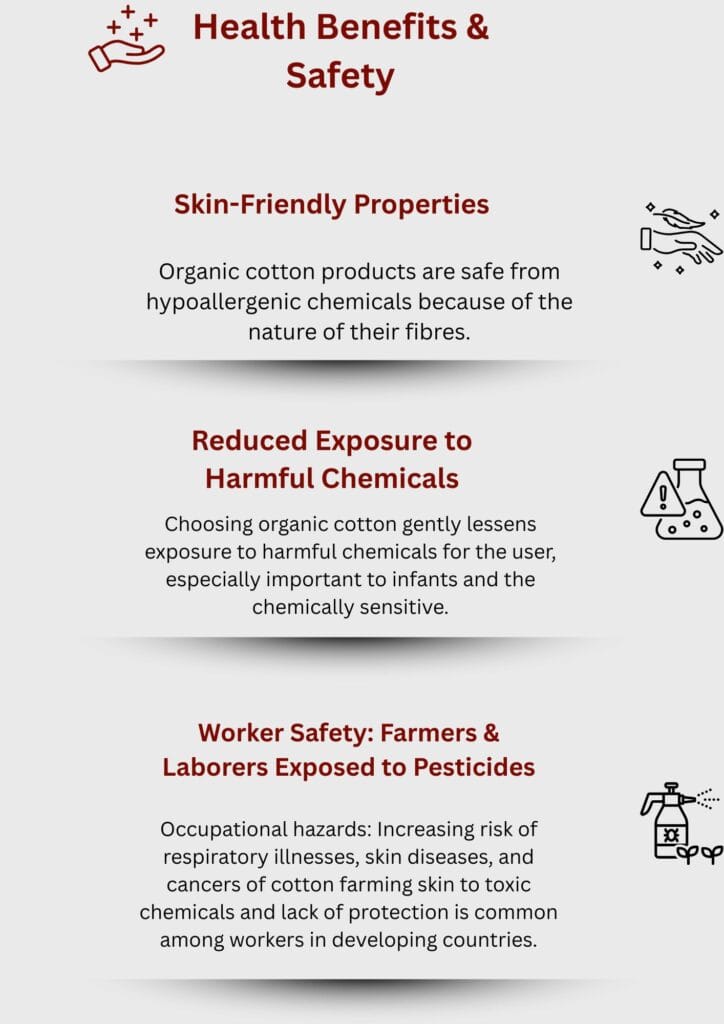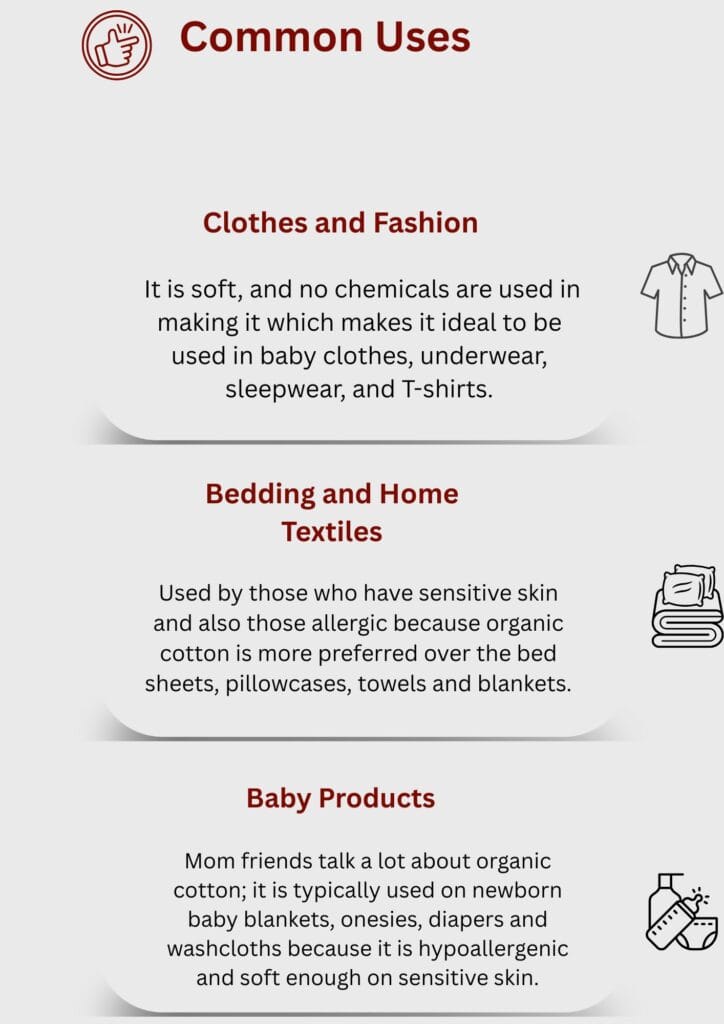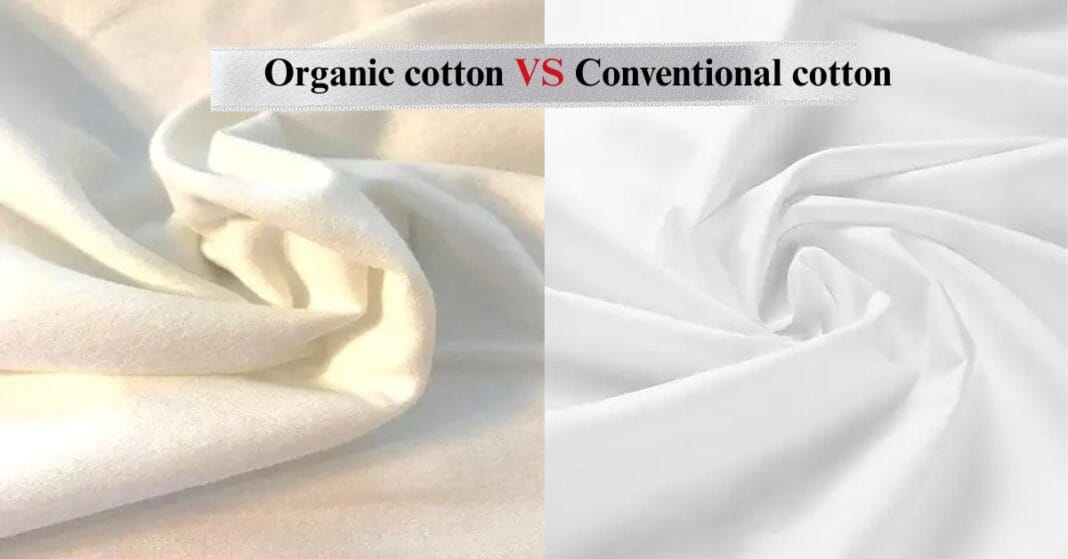Introduction
Cotton is one of the natural fibers most used in the world. Organic cotton and conventional cotton are two very different types of cotton. Knowing the difference is very important for eco-conscious shoppers.organic cotton vs conventional cotton
Organic cotton is produced without the use of pesticides, herbicides, and GMOs. Conversion is an organic farming method that uses nature to enhance soil and biodiversity. Conventional cotton, on the other hand, relies on the use of chemical inputs and GMOs.
This comparison matters because there are impacts of personal health and social ethics to consider. There is an increasing need for understanding the organic cotton vs conventional cotton debate.
Key Differences Between Organic and Conventional Cotton
Farming Methods: GMO vs. Non-GMO and Pesticide Use
Organic cotton farming does not permit GMOs. It preserves ecosystem balance. Farmers use compost and natural fertilizers in crop rotation.
Unlike organic cotton farming, conventional cotton farming makes extensive use of GMOs, synthetic fertilizers, and pesticides. While these might help to obtain greater yields, they damage the local soil, water sources, and wildlife. Chemicals used in such fertilizers and pesticides also contaminates the fabric and poses a hazard to human health.
Water Usage: Which Cultivates Uses More Water?
Water is a significant issue when it comes to cotton cultivation. Conventional cotton uses a significant amount of water, and often draws it from ecosystems that are already under pressure. A case in point, the use of conventional cotton irrigation was one of the main causes of the Aral Sea disaster.
Organic cotton farming, in comparison, often uses water from rain fed systems. This makes it much more resource efficient. Rain fed organic cotton farming uses about 91% less water when compared to conventional methods. This is a vital issue in water conservation when compared to conventional cotton farming, as the water used in organic farming not only conserves resources, but eases the local water supply strain.
Soil Health & Biodiversity: Impact on Ecosystems
The organic farming system uses composting and reduced tillage that preserves soil health, minimizing damage through tillage, and helps hold moisture and nutrients. This further helps maintain biodiversity, and is fueled by the absence of chemical inputs and crop variety.
The use of conventional cotton farming, on the other hand, is often associated with soil degradation and biodiversity loss. Chemical fertilizers that are used to enhance crop yields decimate life sustaining microbes in soil, killing biodiversity and soil fertility. This weakens local ecosystems and productivity in the long term.
Chemical Use: Toxins in Conventional Cotton vs Organic
Conventional cotton has one of the highest chemical usages of any crop. It uses toxic insecticides, herbicides, and even fungicides. These chemicals also contaminate water sources, causing risks to human and animal life.
Environmental Impact of Organic Cotton vs Conventional Cotton
Carbon Footprint Comparison
The footprint of organic cotton is generally lower when compared to conventional cotton. This is because it does not use any fossil fuel-based fertilizers and makes use of regenerative organic farming practices. This also improves greenhouse gas emissions and makes the climate more resilient.
On the other hand, conventional cotton uses fossil fuel-based fertilizers and synthetic farming techniques. This increases the carbon footprint as it requires the use of machinery and energy, making it more expensive to the climate.
Effect on Water Pollution from Pesticide Runoff
Agriculture is one of the largest contributors to waterways pollution, and conventional cotton does it with the help of fertilizer and pesticide applications. These chemicals not only endanger new life but also contaminate rivers, lakes, and underground water sources, putting human life at risk.
Unlike conventional cotton farming, organic cotton farming does not contribute to water pollution with the use of toxic chemicals. Organic cotton farming is safe to water sources as it makes use of natural fertilizers and biological pest control.
Land Degradation & Soil Erosion
Land degradation is one of the increasingly serious problems attributed to conventional cotton farming. Along with over-tilling, the combination of chemical use along with conventional cotton farming also strips the land of essential nutrients and leads to an increase in soil erosion.
Organic cotton enhances soil structure along with its fertility. Erosion control through methods like cover cropping and crop rotation also contribute to land sustainability in the long run. Therefore, the discussion of organic cotton versus conventional cotton also looks at the future of agriculture.
Health Benefits & Safety

Skin-Friendly Properties: Hypoallergenic Benefits of Organic Cotton
Organic cotton products are safe from hypoallergenic chemicals because of the nature of their fibres. This is beneficial for eczema, allergic, or sensitive skin. Organic cotton helps in moisture and breathability.
Conventional cotton does not share the same hypoallergenic benefits. It can hold skin irritating chemicals and dyes that can cause rashes. Organic cotton helps defend skin, especially for babies, and is a much softer choice for clothing and bedding during their sensitive stage.
Reduced Exposure to Harmful Chemicals
Choosing organic cotton gently lessens exposure to harmful chemicals for the user, especially important to infants and the chemically sensitive.
Pesticides and dyes used in conventional cotton products result in chemical residue. Over time, health can be impacted through the toxic exposure from prolonged contact with the skin.
Worker Safety: Farmers & Laborers Exposed to Pesticides
Occupational hazards: Increasing risk of respiratory illnesses, skin diseases, and cancers of cotton farming skin to toxic chemicals and lack of protection is common among workers in developing countries. Not much can be done as the protective measures are inadequate.
Organic cotton farms support the health of their employees by avoiding dangerous and toxic chemicals and by providing better working conditions. This is one more reason why one should prefer organic cotton rather than the non-organic options.
Quality & Durability: Is Organic Cotton Better?
Is Organic Cotton Softer or More Durable?
People usually say organic cotton is softer when compared to normal cotton. This is because organic cotton is handpicked and is not exposed to strong chemicals. This means the fibers are more gentle and softer.
As for the brand or product, durability does differ. However, high-end organic cotton does happen to be durable and in some cases, even more when compared to normal cotton. This is because not going through chemical processing aids in retaining fiber strength.
Long-Term Comparison of Organic Cotton and Normal Cotton
Organic cotton is quite efficient in maintaining its rugged good looks for a long period of time, especially if proper maintenance is given. It does not pile and wear easily, which helps in maintaining good looks even after many washes.
On the other hand, normal cotton which is a result of non organic farming might go through wear and tear much quickly given the aggressive and violent processing methods the cotton goes through before it is deemed ready to be used. Also the chemicals weaken the fibers resulting in a shorter lifespan for the fabric.
Cost & Affordability of Organic Cotton vs Conventional Cotton
Why Is Organic Cotton More Expensive?
The increased price of organic cotton crops stems from lesser total output, higher labor costs, and increased activism for the environment. due to greater attention and care, head, shoulders, toe, and shoulders, A and avoiding chemical on organic cotton.
Paying higher wage for organic cotton farming is more ethical, adds social cost, A ethical and social marginalized farming practices.
Is the Price Difference Justified?
A healthy environment and ethical work gains is worth more for many users and is by far more friendly than unethical work. Taking care of the environment is an investment on the long run yielding better outcomes with fewer problems.
While conventional cotton may be cheaper for spending on a day to day, hidden costs like sickness and labor in the work place make organic a more responsible chose in the long term.
Ethical & Social Impact
Fair Trade Practices in Organic Cotton Farming
Fair Trade Practices in Organic Cotton Farming, many supply chains, Affiliated with organic farming cotton, farm is social construction more of high labor cap, pay for fairly safe supply laboratory.
Through these practices, many organic cotton farming provide education and greater economic scope to workers. Supporting organic farming helps respond and end these negative practices in these construction farming comms.
Child Labor & Worker Exploitation in Conventional Cotton
The conventional cotton industry is infamous for the exploitation of workers and the use of child labor. The ‘fast fashion industry’ tends to buy cheap cotton from countries that do not have good labor laws.
Organic cotton certifications practice ethics. They do not allow child labor and ensure an organic cotton industry treats its workers fairly, which is an added reason why organic cotton is better chosen.
Certifications to Look For in Organic Cotton vs Conventional Cotton
GOTS (Global Organic Textile Standard)
It is the first and the most recognized mark for organic cotton certificiation. It guarantees that the cotton is free from any chemicals, and the production process is environmentally friendly. In addition, it guarantees socially responsible workers’ treatment.
OEKO-TEX Certification
OEKO-TEX guarantees that a product is devoid of any harmful elements. It does not assure organic farming, but does guarantee an item is safe for human use, sometimes in conjunction with GOTS.
Fair Trade Certified
This certification guarantees that workers are treated fairly and free from exploitation and includes support for the community. It offers a significant social addition to organic cotton products.
Common Myths & Misconceptions
“Organic Cotton is Just a Marketing Gimmick” – This is debunked.
Some people think organic cotton is a product without any value but a marketing facade. It is proven by scientific studies, environmental data, and research that benefits organic cotton has advantages for the well-being of people, soil, and water conservation.
“Conventional Cotton is Just as Safe” – Fact Check
Even though conventional cotton looks clean, it can have chemical residue, while organic cotton is far safer as it has no residues, especially for sensitive users like infants.
Which One Should You Choose?
Best for the Environment?
Organic cotton clearly has the upper hand as it avoids pollution, is a powerful step towards sustainability, nurtures the soil, and conserves water.
Best for Health?
Organic cotton proves to be safer for your skin and overall health. It’s especially beneficial for babies and allergy sufferers, as well as those with sensitive skin.
Best for Budget-Conscious Buyers?
While conventional cotton is cheaper, it comes at a long-term health and planetary cost. If you’re on a tight budget, certified organic cotton on sale is a great option, as well as second-hand stores.
Future of Cotton: Sustainable Alternatives
Recycled Cotton
Recycled cotton is the reuse of old cotton garments to reduce waste. It is a smarter alternative to cotton farming as it requires less water and energy.
Regenerative Cotton Farming
Not only sustains the land but actively improves it. This next-level farming restores ecosystems, sequesters carbon, boosts biodiversity, and is called regenerative farming.
Common Uses

Clothes and Fashion
- Organic Cotton: It is soft, and no chemicals are used in making it which makes it ideal to be used in baby clothes, underwear, sleepwear, and T-shirts.
- Conventional Cotton: Mass produced fashion apparel such as jeans, shirts and socks; fast fashion.
Bedding and Home Textiles
- Organic Cotton: Used by those who have sensitive skin and also those allergic because organic cotton is more preferred over the bed sheets, pillowcases, towels and blankets.
- Conventional Cotton: The usage of this Cotton is still common in home furnishings such as curtains, cushions and even rugs because of its cheaper cost.
Baby Products
- Organic Cotton: Mom friends talk a lot about organic cotton; it is typically used on newborn baby blankets, onesies, diapers and washcloths because it is hypoallergenic and soft enough on sensitive skin.
- Conventional Cotton: Mainly used in lots of products and is in use in lots of baby products but there are concerns about chemical residues.
Conclusion
Who Increased Prioritizing Buying Organic Cotton
Parents, eco-friendly individuals, as well as people with skin problems, will benefit from organic cotton the most. These people have the most to gain, and in these scenarios, the advantages definitely exceed the disadvantages.
When is Conventional Cotton Acceptable?
Conventional cotton is fine for people in immediate need with limited finances. However, whenever it is possible within your budget, try to buy ethical and OEKO-TEX certified options.
In the argument between organic and conventional cotton, it really depends on the preference of the customer. However, for the environment, society, and sustainability, organic cotton is the obvious preference.


